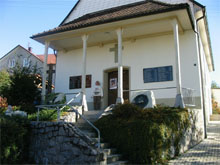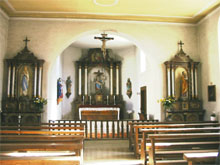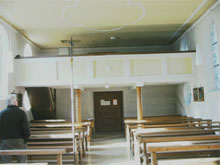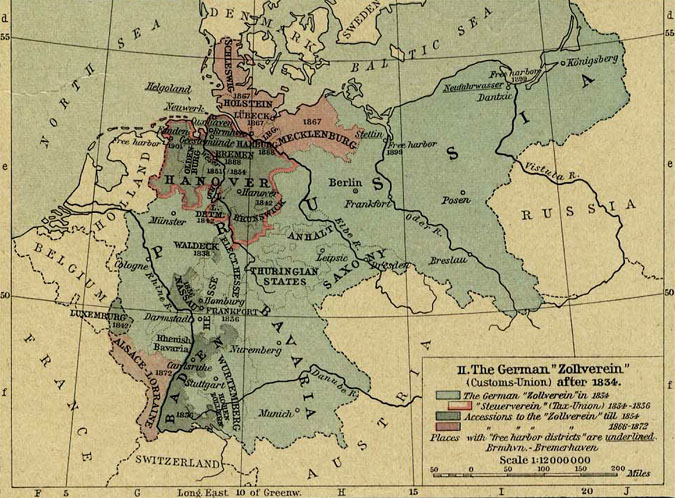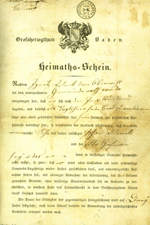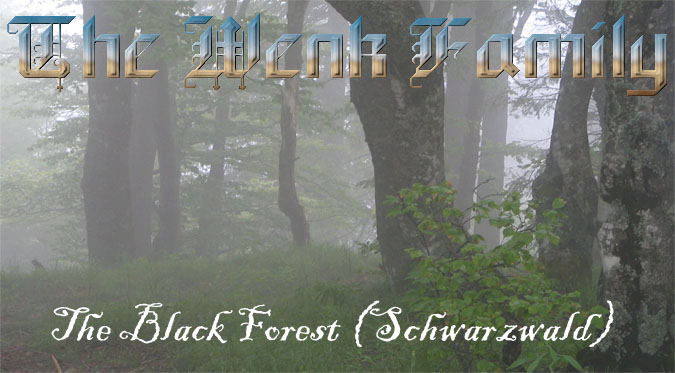 |
"The German is like a willow. No matter which way you bend him, he will always take root again."
—Alexander Solzhenitsyn
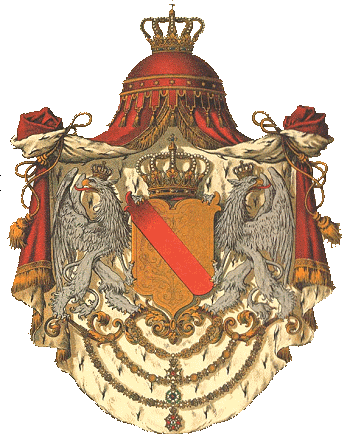 |
These countries all took turns invading each other, and then banding together with their former enemies against the other kingdoms, like France, depending on the mood of the current rulers. It was basically one large game of RISK, only played with real lives. It made life interesting for the rulers, but horrible for the peasants who had to actually fight in those wars... But then the people in charge rarely cared how the peasants felt about it, anyway.
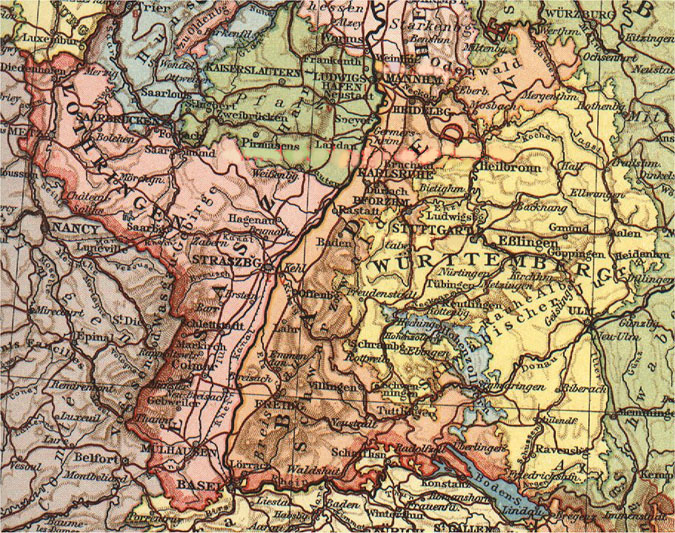
The 'Black Forest Swabians' of Baden spoke a dialect of the German language that is different to this day. They tended to be short in staure, often stout, and dark-haired, in contrast to the taller, fair-haired northern and central Germans. Baden's dynasty goes back to the Counts of Breisgau whose title traces to the 10th century. The Margraviate of Baden (Markgrafschaft Baden) was established on April 27, 1112. Over the centuries, more territories were added to their land.
With the death of Berthold V in 1218, his branch of the family became extinct, and its freehold estates passed on to the margraves of the other branch, whose descendants are still the reigning family of Baden. The first of the line of margraves of this branch was Hermann I, who died a monk in the Abbey of Cluny. Many of his descendants distinguished themselves in the affairs of the Empire, as, for instance, Hermann V (1190-1242), who fought against the Mongols, Rudolf I (1243-88), who was first the enemy and then the friend of Rudolph of Hapsburg; Bernhard I (1372-1431), a generous patron of the monasteries of Gottesaue and Schwarzach; and James I (1431-53), who endowed the collegiate foundation in the city of Baden-Baden.
The intellectual, spiritual, and economic life flourished in Baden at this time. Along the Upper Rhine, the arts and learning were nurtured in intermediate schools, and in the Universities of Heidelberg, and Freiburg, which had a large attendance. The arts and literature were also cultivated in the monasteries.
The first impulse to revolutionize religious ideas in Baden came from an Augustinian monk and theology professor named Martin Luther. He had earned a doctorate in theology from the University of Wittenberg in the early 1500's. In 1518 he spent some time in Heidelberg, where he appeared as a public speaker and planted the seeds for change. The Reformation first took firm root in the Countship of Wertheim, in Constance (1530), in the Countship of Hanau-Lichtenberg (1530), and in the electoral palatinate (1546).
|
But the progress of the Reformation in the Margravate of Baden was far from being uniform. Much of the population of Baden-Baden abandoned Catholicism and adopted Luther's teachings, but at the death of Bernhard III (1536), Duke Albert V of Bavaria, the guardian of Bernhard's son, Philip II, brought the country back to the Catholic Faith. Philip himself (1569-88), who had been educated by the Jesuits at Ingolstadt, became a vigorous opponent of the new teaching.
The Baden-Durlach branch of the royal family laid claim to Baden-Baden during the reign of Philip's successor, Edward Fortunatus, (1588-1600). They occupied a part of the country until 1622, and introduced the Reformation. But Margrave William (1622-77) finally succeeded, with the aid of the Catholic party in the Empire, in gaining the undisputed mastery of the margravate.
His successor, Louis William (1677-1707), rendered many services to the Church and the Empire in fighting against the Turks (1683) and the French. Louis William, his wife, Augusta Sibylla, as regent for their son Louis George (1707-61), and the last named in his turn notably furthered the interests of the Church of Baden.
With the death of Augustus George (1761-71), who by papal dispensation had left the ecclesiastical state, and who founded many religious institutions, the line of Baden-Baden became extinct, and the succession fell to the Baden-Durlach branch. Margrave Ernest (1527-53) of Baden-Durlach had favored the Reformation, and his son Charles II (1553-77) soon established the Reformation in his domains. After this time the Protestant religion remained dominant in the land of Baden-Durlach.
The most noted of the Baden-Durlach rulers were: Frederick V (1622-59), who founded many schools; Frederick VI (1659-77), who distinguished himself by his devotion to the emperor and the Empire; Charles William (1709-38), who in 1715 established the present capital of Karlsruhe, greatly improved the finances and the administration of justice, and zealously promoted the interests of the schools.
But the life of an individual in Baden was only partly concerned with obligations to the noble lord (landlord) or the church. More than anything else the social class of the village into which he/she was born determined the whole life.
THE LIFE OF A FARMER IN BADEN
The Gärtner (common farmers) made up 60-80% of the population, and were considered the second class. They possessed land, also obtained by fief. These farmers worked hard, and usually were able to have a modest standard of living for themselves and their families. The third class consisted of the Tageloehner (day laborers), also called Seldner in Southern Germany, and they made up 20-40% of the population. A "Tageloehner" possessed not much more than a cottage, a vegetable garden and possibly, a goat and some chickens. They worked for the other farmers for day wages. In order to get a feeling for the disparity of wealth in this system, here are some figures from ca. 1800: a good horse cost about 100 guilders, a bull about 40 guilders, and an old cow 15 guilders. The daily (12-hour day) wage for a "Tageloehner" was six Kreuzer—that is one tenth of a guilder! In other words, the Tageloehner class was very, very poor, and had few pleasures in life. As a consequence, they had many children, but because of the level of poverty and poor health conditions, many of those children died immediately after their birth. (Illustration from the illuminated manuscript of Johannes von Tepl's Der Ackermann aus Böhmen or The Peasant from Bohemia, circa 1470. University Library Heidelberg, Cod. Pal. germ. 76, fol. 3r.) |

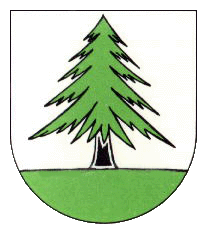 |
The church records in Russwihl list our oldest confirmed ancestor, a man named JOSEPH WENK (? - 1736), who married MARIA DIETSCHIN (1705 - 1779) in 1733. But unlike today, when a man and woman choose their own destiny together, you couldn't just fall in love with somebody and marry them in Baden. Marriage at this time in Baden was a fairly difficult process, involving not just the bride and groom (which is difficult enough), but the entire village.¹
First of all, marriage was only allowed with the permission of the noble lord ("landlord"), and the engaged couple had to pay the lord for his permission (2-10 fl). Secondly, the couple had to prove to him and to the community that they would be able to support themselves and their children without any outside help. A minimum net worth of 100 -200 fl. was required for marriage. Apparently Joseph and Maria made the cut.
It was actually a good time to raise a family in Baden—there was peace, there was prosperity, and the educational system was one of the best in Europe. Joseph and Maria had their first child that very September.
Sadly, tragedy struck when Joseph died just a few years into the marriage, in 1736. So Joseph and Maria had just two children:
CHILDREN OF JOSEPH WENK AND MARIA DIETSCHIN |
|
It was a good time for Baden. Charles Frederick (1738-1811), introduced salutary reforms in all parts of his territory, thus raising his country from the level of a petty principality to the rank of one of the greater central states of the German Empire. The extinction of the Baden-Baden branch greatly increased his possessions, which were still further enlarged by the political changes resulting from the French Revolution.
Joseph Jr. and Maria moved to nearby Oberwihl, just southwest of Stuttgart, near the French border. (Waldshut, Freiburg, Baden-Wurttemberg, Germany: 47° 37' 0" North, 8° 3' 0" East; It was also incorporated with Russwihl into the district of Görwihl in 1975). The village was founded in the second period of colonization of the Hotzenwald area, with its neighboring village, Niederwihl.
Now in a home of their own, Joseph Jr. and Maria had a son:
CHILDREN OF JOSEPH WENK AND MARIA BAHOLZER |
|
There were rights for self-administration and self-jurisdiction of the villages like Oberwihl. The head of the village was the "Vogt" (Governor). The lord selected him out of the members of the community. Under him, two or three Buergermeisters (Mayors) were selected by the "Gemeinde" (community). Sometimes, communities owned considerable amounts of land and forest for common use.
Johan Michael then obtained approval from the landlord and married MARGARETHA EICHHORN of Ebersbühl, Germany, but his young wife died before she could give him any children.
The times were getting tougher for everyone in Baden. In 1796 Charles Frederick was forced to surrender his possessions on the left bank of the Rhine to France. But both Baden and Johan Michael were about to experience a rebirth.
On February 3, 1801, Johan Michael remarried, to KATHARINA FALLER (27 Aug 1776 - 22 Sep 1843), also of Oberwihl.
Meanwhile, Baden was expanding: Charles Frederick was compensated by the Imperial Delegates' Enactment (1803) for his losses to France. He received the Diocese of Constance, that part of the Rhine Palatinate lying on the right bank of the river, including the cities of Heidelberg, Mannheim, etc., parts of the Dioceses of Strasburg and Speyer, eleven religious houses and abbeys, and seven cities of the empire. By the Peace of Pressburg (1805), and the accession of Baden to the Confederation of the Rhine (1806), Baden was further enlarged by the former possessions of Austria in the Breisgau, the city of Constance, and other territories.
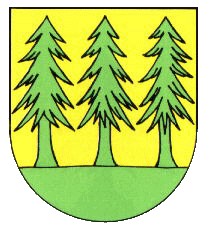 |
In return, Karl Friedrich was obligated to provide a contingent of Badeners for Napoleon's invasion of Russia in 1812. Most of the 7,100 Badeners in the Grande Armee would die in Russia. By 1815, having joined the allies, Baden provided 8,000 line troops and 8,000 Landwehr, and formed a Landsturm. Distrustful of citizen soldiers, the Grand Duke abolished the Landwehr and Landsturm shortly after the end of the war in 1815.
Between wars and purges, the Wenk family faced losses of their own: Johan Michael and Katharina escaped all of this conflict and had ten children, but in those hard times at least six out of their ten children died before their third birthday:
KIDS OF JOHAN MICHAEL WENK AND KATHARINA FALLER |
|
He became a middle-class farmer and lived in a time of relative good fortune for that area. The potato was the chief product of the town, and it sold well all over the region.
Most of the farmers had a sideline profession that was usually handed down from father to son. In the upper class: an occupation that brought in the most money, like an innkeeper. In the middle class, jobs included smith, cartwright, cooper, tailor, shoemaker, etc. In the lower class were such professions as weaver, ropemaker, tanner etc. We know than Johan's son, Joseph, was a tailor in Michigan, so it's safe to assume that Johan was too, as it was a typical job for a middle class bauer.
The good fortune for Johan Wenk, Jr., continued as he married a woman named IDA GASSMANN or GAßMANN (11 Feb 1802 - 23 Dec 1854) of Rotzel. (The ß is the equivalent of two s' in English.)
However, Ida had been previously married. Her first marriage was dissolved in 1822. Although that union ended badly, one good thing did come out of it, in that it brought her a son, IGNATIUS "IGNANZ" "IGNATZ" GASSMANN was born on 30 Jul 1823 and baptized on 31 Jul 1823 at Katholisch, Hochsal, Waldshut, Baden.
Johan Jr. welcomed the young boy into the family, and adopted Ignatz as his own son.² The Catholic church where this occurred is pictured here, as it looked in the year 2000, when visited by Ignatz' great-granddaughter, Martha Wenk-Hause:
|
This was an unusual occurance in Germany: Adoption law in Germany was based on Roman law, under which the institution of adoption enabled childless couples to transfer their names and estates to posterity. Adult adoption was the prototype. The adopter would adopt an adult who he deemed suitable as a successor of his business or estate and future bearer of his name. (This model prevailed in the civil codes or statutes of the German states during the 18th and 19th centuries, and was also incorporated in the German Civil Code of 1900, and remained this way until 1976, when the law was reformed to reflect changing attitudes and that it had principally become an institution to provide a new home for children). Adoption was constructed as a contract between the adopter and the adoptee rather than a government decree regarding a child.³ So the bond between Johan and Ignanz must have been strong.
Johan Wenk, Jr. and Ida had seven more children, after Ignatz. But while their family grew, their village shrank. A history book of the Görwihl area, translated by Ernst Wenk, states that by 1854: "There is hardly another town where the differences between the living conditions of the 1830's and early 1840's and the present living conditions are more distinct than Oberwihl. At the earlier time all native plants thrived and particularly the potatoes were of such quality and grew in such abundance that the potatoes of Oberwihl, selling under the name 'Oberwihler,' were a popular market item all around. Additionally there were nearly in every house two looms that earned through the finishing of cotton good substantial income. But the people of Oberwihl were not insightful and reasonable enough to envision that the good times could change. Proudly did they discontinue their collective church service at Niederwihl and built their own chapel in which they conduct now every Sunday and on holidays their separate religious services. The inns and pubs did marvelous business and everybody paid high prices. Now, with the times changed drastically, they cannot get over their being spoilt and the proper industriousness is not yet being developed. They have difficulties to forgo frequenting the inns and pubs and besides farming and cotton goods weaving they have never learned any other skills, so that today this large village does not have a blacksmith nor a carpenter."
With times now looking more bleak, their children began thinking of emigration. Those children were:
CHILDREN OF JOHAN WENK, JR., AND IDA GASSMANN |
|
|
|
|
|
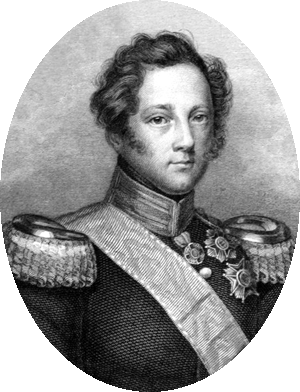
|
So with the only seeds in the area taking root being those of discontent, and despite the introduction of many reforms during the reign of Grand Duke Leopold (1830-52), there were often bitter rows between the Government of Baden and the people, such as the salpetererunruhen (saltpeter riots), involving extended family members, along the southern part of the Black Forest, the former "County of Hauenstein", as well as other parts of Upper Austria, that had fallen to the new Grand Duchy of Baden in 1815. These previously Catholic areas fell under the rule of a Protestant Grand Duke and his administration. The inhabitants of the county, who were attached to the traditional imperial house of Habsburg and identified with it, viewed the new government with great suspicion. The "Saltpeterers" refused to send their children to schools with "un-Catholic" teachers or no longer went to churches where priests of a reformed Catholicism (Wessenbergianism) preached. Compulsory vaccination was also unpopular. Over time, this resistance crumbled, and only a hard core remained, but the resentment persisted. Over time, the opponents of the government became more radical and gained new followers, until a leading party of radical opposition was formed.
With this political fighting, the revolutionary movement of 1848 took hold in Baden. Although the government granted many of the demands of the people for more liberal administration, violent protests and outbreaks still occurred. In the beginning they were suppressed, but a mutiny of the troops in Rastatt and Karlsruhe brought victory to the Revolutionaries.
|
||||||||||||||||||||||||||||||||
Finally, the revolution in Baden was repressed, and the Grand Duke reestablished his authority—but now he ruled a wasteland. Severe punishment was meted out to the guilty, especially to the mutinous soldiers. A number of the them fled to the United States, and several served in the US Civil War.
It's unknown how involved 24 year-old Ignatz became in the insurrections in Baden, or which side of the struggle he was on, if any. But we do know that he didn't wait around to see how it played out—he had already headed to America for a fresh start in May of 1848.
The German refugees fleeing to the United States at this time, mainly from Baden, Vienna, and Berlin, became known as the "forty-eighters," because of the year of the uprisings that they escaped. Although most of the historical attention has focused on the revolution-minded intellectual "forty-eighters" who came to America between 1848 and 1855 and angered the public with their controversial (meaning anti-slavery) political views, the majority of Germanic immigrants were simple farmers and laborers who were just trying to earn a buck, including Ignatz. During the 1840's crop failures and potato disease had ruined many farmers, and they sought a fresh start.
Most of the state authorities in the area attempted to repress emigration, but liberal governments in Baden and Württemberg were more lenient. If poor citizens and political offenders wanted out, they were happy to let them go.
Transport across the Atlantic was easy to obtain, as well, because shipping companies carrying tobacco and cotton to Europe started transporting emigrants to America in order to make more money, and even hired agents to spread the word and fill the boats. The United States government even had a hand in in. One such agent was a representative from the state of Michigan, who was stationed in Stuttgart. Whether or not Ignatz Wenk spoke to this man is unknown, but tales passed down through the family infer that he was aware of a German enclave in Washtenaw County, Michigan, where he could start anew.⁴
For the most part, emigrants were recruited from the middle and lower classes. Often a family group put all their money together in order for one of their sons to emigrate. They hoped that he would earn enough money in the New World to later pay for their crossing. In many cases, this happened. Upper class people only emigrated when a farm had been willed to one son (not too rare, the youngest one!) and this heir would give his brothers some money to find a new existence outside the village. Ignatz would accomplish this, and send for his younger brother, Joseph, about 20 years later.
Ignatz' passport states: "Ignatz Wenk from Oberwihl told the village officers that he is going to the United States of America, where he wants to work to earn a living. He needs a document from his place of birth. We certify that he is the legal son of Johan Wenk, who lives here, and Ida Grossman (Gassman). Ignatz Wenk has the right to be a member of our village. He is allowed and welcomed to return here. There is one exception of the rule which he knows. If he should get married there without the permission of our State, the rights as citizen of our State will be taken from him." A travel document written on the 13th of March, 1848, lists him as a healthy man of medium stature, with blonde hair, gray eyes, and good teeth. He was headed for Baltimore by way of the port city of Le Havre in Northern France, through New York. He spent nearly all of the money his parents had given him and that he had saved up doing odd jobs just to buy the ticket. Whether he liked America or not, it was doubtful that he could ever make it back to Baden. So he said good-bye to his family and friends, probably forever, and started off.
It was a bold move that changed the history of the Wenk family. In the next twenty years or so he would send for a wife and child, and eventually be joined by his younger half-brother, Joseph.
Meanwhile, out of all the surviving sons of Johan II and Ida Gassman, only Johan III remained in Baden, where he was Principal Teacher at Eschbach. But he had no heirs, so today the Wenk family has disappeared from the region. So if you want to meet a Wenk today, your best bet for finding one would be to travel to Michigan rather than Rotzell! All thanks to our brave, resourceful ancestor...
 |
NOTES ON THIS PAGE:
¹—"A Brief Description of a Typical Southern German Village in the Past Centuries," by Dieter Joos Ueberlingen, Germany (djoos@dieter-joos.de). April, 2006.
²—So we are (probably) not Wenks by blood, as our ancestor was adopted into the Wenk family. Our only DNA-proven bloodline through Ignatz Wenk, our ancestor, is through his mother's line—the Gaßmann family. Document: "wohl Namenseanderung oder Adoption, Kaum eire Legitimation! Ig(t) Gaßmann b~w Wenk ist darum lediglich Namenstrager und nicht Blutsverwandter!" This event was unknown to the modern Wenk families, until Ernst Wenk made the discovery of the adoption in church records during the 21st Century.
³—For a short overview of the historical development, see Bosch, Entwicklungen und Probleme des Adoptionrechts in der Bundersrepublik Deutschland, Zeitschrift für das gesamte Familienrecht, 1984, 829 [830]; for a detailed account see Engler, in: J. v. Staudingers Kommentar zum Bürgerlichen Gesetzbuch, Vol. IV., Familienrecht Teil 3b, Achter Titel, Vorbem., No. 1 ss.
⁴—"From Germany to Washtenaw County: A Story of a German Immigrant and his Descendants in America," by Kurtis McDonald, 1997.
|
CHAPTER 1: WENKS FROM FROM BADEN TO WORSE, 1705 - 1849 CHAPTER 2: IGNATZ WENK, 1850 - 1997 CHAPTER 3: MARTIN WENK, 1876 - 1962 CHAPTER 4: ERWIN WENK, 1910 - 1982 CHAPTER 5: THE WENK FAMILY TODAY, 1940 - PRESENT
APPENDIX A: WENK FAMILY REUNIONS, 1923-PRESENT APPENDIX B: CENSUS REPORTS, 1870 - 1950 APPENDIX C: FAMILY TIMELINE, 1700-PRESENT |

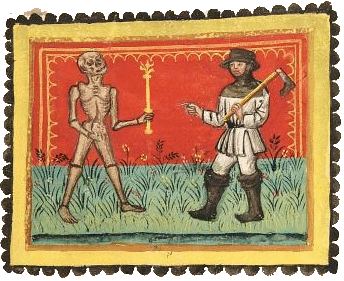
.gif)
.gif)
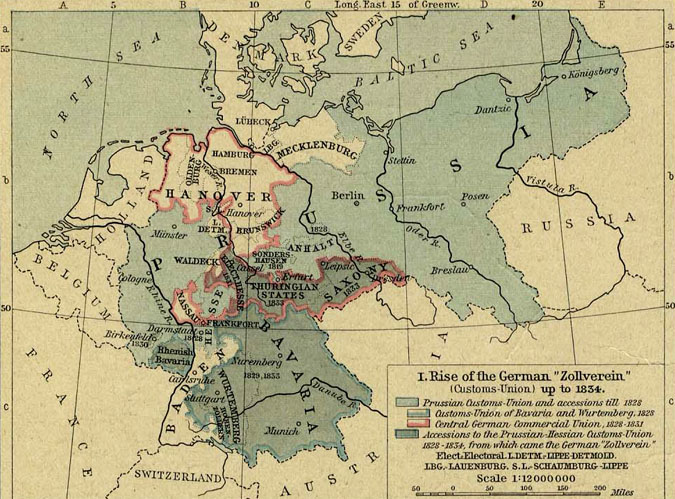
.gif)
